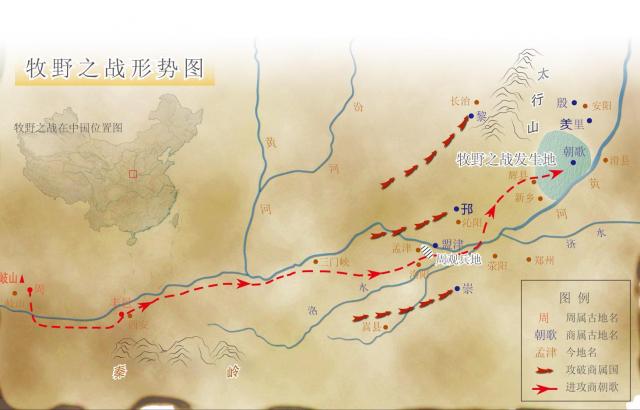Shang Dynasty
商朝
Battles of Muye
牧野之战
The Battle of Muye (or Mu)(牧野之战)was fought in China in 1046 BC.
牧野之战与公元前1046年在中国发生。
The battle led to the end of the Shang dynasty, and the beginning of the Zhou dynasty.
这场战争导致了商朝的灭亡和周王朝的开始。
The Zhou dynasty marks the beginning of the feudal phase of Chinese history.
周朝标志着中国封建社会历史的开端。
By the 13th century BC, Shang influence had reached what is now Gansu Province, a region that was occupied by a people known as the Zhou.
公元前十三世纪,商朝的势力范围扩大到了今天的甘肃省境内,而甘肃正是周文王姬昌的领地,
King Wen (Ji Chang), the ruler of the Zhou, who was a Shang vassal, was given the title “Count of the West” by the king Di Xin of Shang.
姬昌是商朝的诸侯,被商王帝辛敕封为西伯侯。

Di Xin used King Wen to guard his rear while he was involved in a south-eastern campaign.
彼时帝辛忙于东南战事,故用文王守卫自己的后方。
Shou Xin, fearing King Wen’s growing power, imprisoned him.
受辛畏惧文王日益成长的力量,将其囚禁了起来。
King Wen’s son King Wu (Ji Fa) led the Zhou in a revolt.
文王之子武王姬发领导周朝民众,发起了对商朝的反抗。
King Wu led an army of 3 800 Shang defectors. Di Xin’s army was much larger than Wu’s.
武王领导着一支由3800商朝叛逃者组成的军队,而帝辛的军队则远远多于武王。
Seeing his army outnumbered, Wu instructed his troops to march in strict formation and advance slowly.
意识到敌众我寡,武王指挥其军队以严格的队形缓慢行军。
The Shang began their attack in the morning, but the front rank was thrown into confusion, disordering those behind them.
商朝于清晨发动进攻,但先行部队陷入混乱,使得后方部队也混乱涣散,
The Zhou were victorious and showed little mercy to the defeated Shang, shedding enough blood “to float a log”.
最终武王赢得了牧野之战,对于战败的商朝军队没有丝毫怜悯之情,血流遍野足够让木头漂浮。
After the battle, Di Xin committed suicide in his palace, leaving Wu master of most of the Huang He valley.
战败后,商王帝辛自焚与鹿台,使得武王一统黄河流域。
Wu proclaimed the Zhou dynasty.
此役过后,武王昭告天下,建立周朝。












